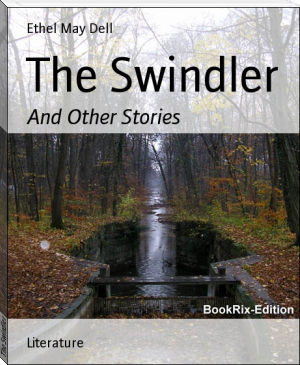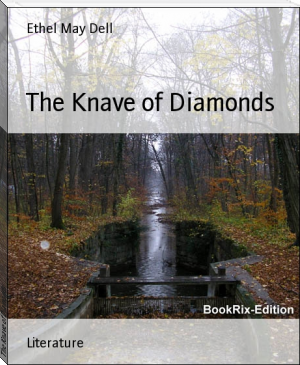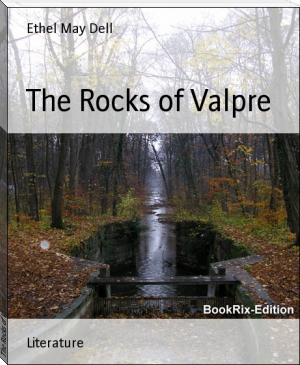The Swindler by Ethel May Dell (books to read for teens .TXT) 📖

- Author: Ethel May Dell
Book online «The Swindler by Ethel May Dell (books to read for teens .TXT) 📖». Author Ethel May Dell
"He is only stunned." It was Fletcher's voice above her. "Leave him alone. He will soon come to his senses. Serves him right for acting the clown in this get-up."
She looked up sharply at that and a perfect tempest of indignation took possession of her, banishing all fear.
"What he did," she said, in a voice that shook uncontrollably, "was for my sake alone, that he might be able to protect me from cads and blackguards. I refuse to leave him like this, but the sooner you go, the better. I will never--never as long as I live--speak to you again!"
Her blazing eyes, and the positive fury of her voice, must have carried conviction to the most obtuse, and this Fletcher certainly was not. He stood a moment, looking down at her with an insolence that might have frightened her a little earlier, but which now she met with a new strength that he felt himself powerless to dominate. She was not thinking of herself at all just then, and perhaps that was the secret of her ascendancy. His own brute force crumbled to nothing before it, and he knew that he was beaten.
Without a word he bowed to her, smiling ironically, and turned upon his heel.
She drew a great breath of relief as she saw him go. She felt as though a horrible oppression had passed out of the atmosphere. That fairy haunt with its bubbling fountain and sapphire lamps was no longer an evil place.
She bent again over her senseless companion.
"Ronald!" she whispered. "My dear, my dear, can't you hear me? Oh, if only you would open your eyes!"
She soaked her handkerchief in the water and held it to the wound upon his forehead. Even as she did it, she felt him stir, and the next moment his eyes were open, gazing straight up into her own.
"Damn the brute!" said Lord Ronald faintly.
"You are better?" she whispered thankfully.
His hand came upwards gropingly, and took the soaked handkerchief from her. He dabbed his face with it, and slowly, with her assistance, sat up.
"Where is he?" he asked.
"He has gone," she told him. "I--ordered him to go."
"Better late than never," said Lord Ronald thoughtfully.
He leaned upon the edge of the fountain, still mopping the blood from his face, till, suddenly feeling his beard, he stripped it off with a gesture of impatience.
"Afraid I must have given you a nasty shock," he said. "I didn't expect to be mauled like this."
"Please--please don't apologise," she begged him, with a sound that was meant for a laugh, but was in effect more like a sob.
He turned towards her in his slow way.
"I'm not apologising. Only--you know--I've taken something of a liberty, though, on my honour, it was well meant. If you can overlook that----"
"I shall never overlook it," she said tremulously.
He put the _chuddah_ back from his head and regarded her gravely. His face was swollen and discoloured, but this fact did not in the smallest degree lessen the quaint self-assurance of his demeanour.
"Yes, but you mustn't cry about it," he said gently. "And you mustn't blame yourself either. I knew the fellow, remember; you didn't."
"I didn't know you, either," she said, sitting down on the edge of the fountain. "I--I've been a perfect fool!"
Silence followed this statement. She did not know quite whether she expected Lord Ronald to agree with her or to protest against the severity of her self-arraignment, but she found his silence peculiarly hard to bear.
She had almost begun to resent it, when suddenly, very softly, he spoke:
"It's never too late to mend, is it?"
"I don't know," she answered. "I almost think it is--at my age."
He dipped her handkerchief again in the fountain, and dabbed his face afresh. Then:
"Don't you think you might try?" he suggested, in his speculative drawl.
She shook her head rather drearily.
"I suppose I shall have to resign myself, and get a companion. I shall hate it, and so will the companion, but----"
"Think so?" said Lord Ronald. He laid his hand quietly on her knee. "Mrs. Denvers," he said, "I am afraid you thought me awfully impertinent when I suggested your marrying me the other day. It wasn't very ingenious of me, I admit. But what can you expect from a nonentity? Not brains, surely! I am not going to repeat the blunder. I know very well that I am no bigger than a peppercorn in your estimation, and we will leave it at that. But, you know, you are too young, you really are too young, to live alone. Now listen a moment. You trust me. You said so. You'll stick to that?"
"Of course," she said, wondering greatly what was coming.
"Then will you," he proceeded very quietly, "have me for a watch-dog until you marry again? I could make you an excellent Sikh servant, and I could go with you practically everywhere. Don't begin to laugh at the suggestion until you have thoroughly considered it. It could be done in such a way that no one would suspect. It matters nothing to any one how I pass my time, and I may as well do something useful for once. I know at first sight it seems impossible, but it is nothing of the sort in reality. It isn't the first time I have faked as a native. I am Indian born, and I have spent the greater part of my life knocking about the Empire. The snake-taming business I picked up from an old bearer of mine--a very old man he's now and in the trade himself. I got him to lend me his most docile cobra. The thing was harmless, of course. But all this is beside the point. The point is, will you put up with me as a retainer, no more, until you find some one more worthy of the high honour of guarding you? I shall never, believe me, take advantage of your kindness. And on the day you marry again I shall resign my post."
She had listened to the amazing suggestion in unbroken silence, and even when he paused she did not at once speak. Her head was bent, almost as though she did not wish him to see her face--he, the peppercorn, the nonentity, whose opinion mattered so little!
Yet as he waited, still with that quiet hand upon her as though to assure her of his solidity, his trustworthiness, she spoke at last, in a voice so small that it sounded almost humble.
"But, Lord Ronald, I--I may never marry again. My late marriage was--was such a grievous mistake. I was so young at the time, and--and----"
"Don't tell me," he said gently.
"But--but--if I never marry again?" she persisted.
"Then--unless, of course, you dismiss me--I shall be with you for all time," he said.
She made a slight, involuntary movement, and he took his hand away.
"Will you think it over before you decide?" he said. "I will come to you, as soon as I am presentable, for your answer. For the present, would you not be wise to go back to your friends? I am too disreputable to escort you, but I will watch you to the palace steps."
He got to his feet as he spoke. He was still absently mopping his face with the scrap of lace he had taken from her.
Beryl stood up also. She wanted to be gracious to him, but she was unaccountably shy. No words would come.
He waited courteously.
At last:
"Lord Ronald," she said with difficulty, "I know you are in earnest. But do you--do you really wish to be taken at your word?"
He raised his eyebrows as if the question slightly surprised him.
"Certainly," he said.
Still she stood hesitating.
"I wish you would tell me why," she said, almost under her breath.
"Why?" he repeated uncomprehendingly.
"Yes, why you wish to safeguard me in this fashion," she explained, in evident embarrassment.
"Oh, that!" he said slowly. "I suppose it is because I happen to care for your safety."
"Yes?" she murmured, still pausing.
He looked at her with his straight grey eyes that were so perfectly true and kind.
"That's all," he said, and smiled upon her reassuringly.
Beryl uttered a sharp sigh and let the matter drop. Nonentity though he might be, she would have given much for a glimpse of his inner soul just then.
X
For three days after the reception at Farabad Beryl Denvers returned to her seclusion, and during those three days she devoted the whole of her attention to the plan that Lord Ronald Prior had laid before her. It worried her a good deal. There were so many obstacles to its satisfactory fulfilment. She wished he had not been so pleasantly vague regarding his own feelings in the matter. Of course, it was a feather-brained scheme from start to finish, and yet in a fashion it attracted her. He was so splendidly safe, so absolutely reliable; she needed just such a protector. And yet--and yet--there were so many obstacles.
On the fourth day Lord Ronald's card was brought to her. He did not call at the conventional hour, and the reason for this was not hard to fathom. He had come for her final decision, and he desired to see her alone.
She did not know how to meet him or what to say, but it was useless to shirk the interview. She entered her drawing-room with decidedly heightened colour, even while telling herself that it was absurd to feel any embarrassment in his presence.
He was waiting for her on his favourite perch, the music-stool, swinging idly to and fro, with his customary serenity of demeanour. He moved to meet her with a quiet smile of welcome. A piece of strapping-plaster across his left temple was all that remained of his recent disfigurement.
"I hope my visit is not premature," he remarked as he shook hands.
"Oh, no!" she answered somewhat nervously. "I expected you. Please sit down."
He subsided again upon the music-stool, and there followed a silence which she found peculiarly disconcerting.
"You have been thinking over my suggestion?" he drawled at length.
"Yes," she said. "Yes, I have." She paused a moment, then, "I--am afraid it wouldn't answer," she said, with an effort, "though I am very grateful to you for thinking of it. You see, there are so many obstacles."
"But not insurmountable, any of them," smiled Lord Ronald.
"I am afraid so," she said.
He looked at her.
"May I not hear what they are?"
She hesitated.
"For one thing, you know," she said, "one pays one's servants."
"Well, but you can pay me," he said simply. "I shall not ask very high wages. I am easily satisfied. I shouldn't call that an obstacle."
She laughed a little.
"But that isn't all. There is the danger of being found out. It--it would make it rather awkward, wouldn't it? People would talk."
"No one ever talks scandal of me," said Lord Ronald comfortably. "I am considered eccentric, but quite incapable of anything serious. I don't think you need be afraid. There really isn't the smallest danger of my being discovered, and even if I were, I could tell the truth, you know. People always believe what I say."
She smiled involuntarily at his simplicity, but she shook her head.
"It really wouldn't do," she said.
"What! More obstacles?" he asked.
"Yes, one--the greatest of all, in my opinion." She got up and moved across the room, he pivoting slowly round to watch her.
She came to a stand by her writing-table, and began to turn over a packet of letters that lay there. She did it mechanically, with
 Have you ever thought about what fiction is? Probably, such a question may seem surprising: and so everything is clear. Every person throughout his life has to repeatedly create the works he needs for specific purposes - statements, autobiographies, dictations - using not gypsum or clay, not musical notes, not paints, but just a word. At the same time, almost every person will be very surprised if he is told that he thereby created a work of fiction, which is very different from visual art, music and sculpture making. However, everyone understands that a student's essay or dictation is fundamentally different from novels, short stories, news that are created by professional writers. In the works of professionals there is the most important difference - excogitation. But, oddly enough, in a school literature course, you don’t realize the full power of fiction. So using our website in your free time discover fiction for yourself.
Have you ever thought about what fiction is? Probably, such a question may seem surprising: and so everything is clear. Every person throughout his life has to repeatedly create the works he needs for specific purposes - statements, autobiographies, dictations - using not gypsum or clay, not musical notes, not paints, but just a word. At the same time, almost every person will be very surprised if he is told that he thereby created a work of fiction, which is very different from visual art, music and sculpture making. However, everyone understands that a student's essay or dictation is fundamentally different from novels, short stories, news that are created by professional writers. In the works of professionals there is the most important difference - excogitation. But, oddly enough, in a school literature course, you don’t realize the full power of fiction. So using our website in your free time discover fiction for yourself. 




Comments (0)